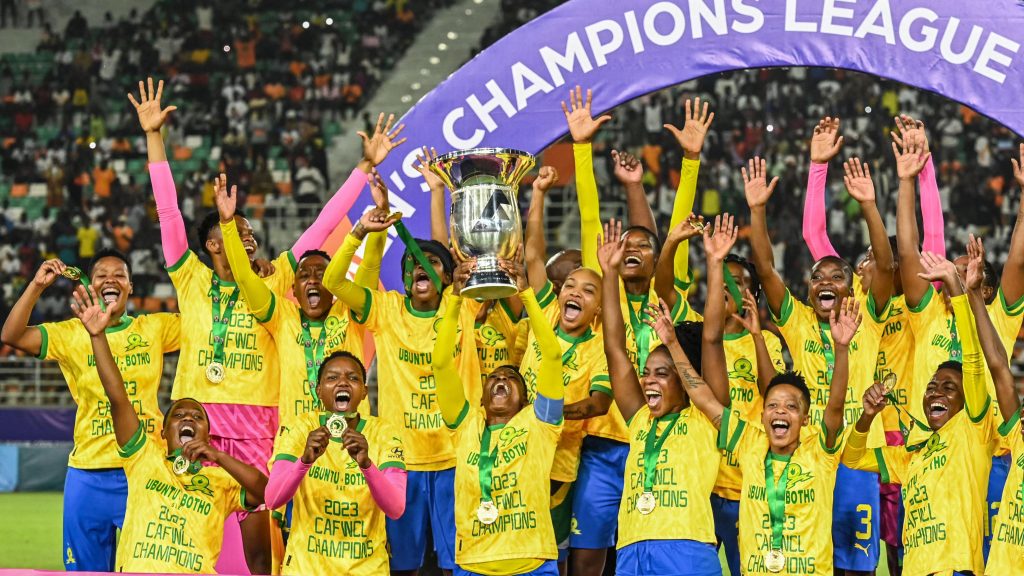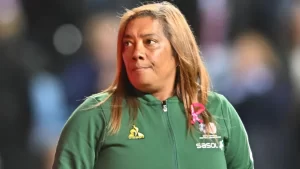No plans to expand African Women’s Champions League
4 min read
South Africa's Mamelodi Sundowns are two-time Caf Women's Champions League winners, lifting the trophy in 2021 and again last year. BBC
The Confederation of African Football (CAF) has confirmed that the African Women’s Champions League will not expand from its current eight-team finals format for the foreseeable future, primarily due to financial constraints. As the competition enters its fourth edition in Morocco, Mamelodi Sundowns of South Africa will look to defend their title, but CAF officials emphasize the challenges of expanding the tournament in the near future.
Financial Limitations and Current Structure
Meske Goshime, the head of women’s football at CAF, explained that the key barrier to expanding the competition is financial. Unlike the men’s version, which features 16 teams, CAF is not in a position to support a similar structure for the women’s competition. Goshime pointed out the logistical and financial difficulties of organizing home-and-away matches across a larger number of teams, particularly given the travel challenges within Africa.
“Our clubs are not financially strong enough to handle the costs of traveling multiple times for home and away fixtures,” Goshime said. “Travel in Africa can be incredibly difficult, with long journeys, sometimes lasting up to 24 hours.”
For the time being, CAF plans to continue with zonal qualifiers, which it hopes will encourage more member associations to engage in the competition. Goshime stated that CAF’s main focus is improving the quality of domestic leagues across the continent, which would ultimately strengthen national teams. Only once these leagues are more robust will the organization consider increasing the number of teams in the final tournament.
Prize Money and Professionalization
This year’s competition sees a slight increase in the prize money, with a 52% boost compared to previous editions. Each team will receive at least $150,000, while the champions will earn $600,000. The runner-up will receive $400,000, offering a financial incentive that could help grow women’s football across the continent.
CAF is also focused on improving the professionalism of the women’s game, with an emphasis on creating a competitive environment that encourages player development. Goshime added, “Our goal is to ensure that the Women’s Champions League becomes a strong brand, a prestigious competition. Once we’ve made progress in that area, we can start considering expanding the number of teams in the finals.”
First-Time Competitors and Group Stage Preview

This year’s competition features a diverse range of teams, with five sides making their debut. Since the tournament’s inception in 2021, 23 different clubs have participated, with Sundowns and AS FAR of Morocco as the only consistent participants, having appeared in all editions. The group stages will see Sundowns face debutants FC Masar of Egypt, Commercial Bank of Ethiopia (CBE), and Nigeria’s Edo Queens in Group B. Meanwhile, Group A will feature hosts AS FAR, Aigles de la Medina from Senegal, TP Mazembe of the Democratic Republic of Congo, and the University of the Western Cape from South Africa.
University of the Western Cape’s coach, Thinasonke Mbuli, called the tournament a “dream” for her team. She expressed confidence in her squad’s ability to advance from the group stage, noting that the experience of participating in such a high-profile competition would be invaluable. Mbuli, who has also coached at the Women’s World Cup and Women’s Africa Cup of Nations (WAFCON), hopes her experience will help prepare her players mentally for the pressures of the tournament.
In Group B, Sundowns will be eager to extend their dominance, but will face tough competition from the debutants. Edo Queens’ coach, Gabriel Aduku, highlighted Nigeria’s historical success in women’s football but acknowledged that the country’s dominance has not yet translated into success at the club level. CBE’s forward, Senaf Wakuma, also spoke about the team’s readiness and ambition to reach the semi-finals after winning the regional Cecafa title.
Development and Scouting Opportunities
Banyana Banyana coach Desiree Ellis, who will be following the competition closely, emphasized the importance of the tournament as a “shop window” for African talent. Players such as Ghana’s Evelyn Badu and Morocco’s Ibtissam Jraidi have used the competition as a stepping stone to secure moves to European clubs, further raising the profile of the tournament.
Ellis believes the level of competition in the Champions League has improved each year, and the tournament is playing an essential role in developing players and providing them with international exposure. “The competition is getting better every year, and the talent on display is remarkable,” she said.
Future Ambitions and CAF’s Long-Term Goals
Looking ahead, CAF has expressed its ambition to strengthen African clubs’ representation at the inaugural FIFA Women’s Club World Cup, which will take place in early 2026. Goshime said that once the two African teams qualifying for the competition are determined, CAF will ensure that they receive adequate support and preparation for the global stage.
2024 CAF Women’s Champions League Group Stage
- Group A: AS FAR (Morocco), Aigles de la Medina (Senegal), TP Mazembe (DR Congo), University of the Western Cape (South Africa)
- Group B: Mamelodi Sundowns (South Africa), FC Masar (Egypt), Commercial Bank of Ethiopia (Ethiopia), Edo Queens (Nigeria)
The group stage will run from November 9-16, with the semi-finals on November 19, the third-place play-off on November 22, and the final on November 23.
While CAF isn’t planning immediate expansion, the Women’s Champions League remains a crucial event for the development of women’s football across Africa, showcasing rising talent and raising the profile of the game.







